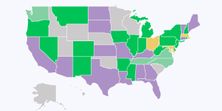Tennessee Sports Betting Update: 3 Major Books Nearing Launch, Many More to Come
Photo credit: Bryan Lynn/Icon Sportswire via Getty Images. Pictured: Tennessee Volunteers flag
Tennessee officials conditionally approved operating licenses for FanDuel, BetMGM and DraftKings last week, opening the door for all three to launch in the coming weeks.
Officials will meet twice more in October to review other applications and finalize existing ones with the expectation that at least the three aforementioned sportsbooks will receive final approval to go live by Nov. 1.
If Tennessee sports betting begins as expected, it will be the 19th state (plus Washington D.C.) to accept a legal sports bet. It will be the first to allow online wagering without opening a brick-and-mortar sportsbook.
Key Tennessee Sports Betting Details
The expected November launch will cap off nearly a year-and-a-half of regulatory work after Tennessee legalized sports betting in May 2019.
Tennessee will be the first state with multiple “untethered” online sportsbooks, meaning the operators don’t have to associate or partner with an existing land-based gaming facility. It is also the first state with an uncapped number of possible applicants, so Tennessee bettors should expect most major sportsbook brands to enter the market.
FanDuel and DraftKings have been two of the largest sportsbooks by market share since the U.S. Supreme Court struck down the federal wagering ban (PASPA) in May 2018, while MGM has sought to expand its traditional gaming offerings by aggressively promoting its BetMGM digital sportsbook.
The companies’ name recognition, early market entry and extensive advertising campaigns will likely help all three become Tennessee revenue leaders despite the potential for a dozen or more competitors.
While Tennessee is hypothetically open to an unlimited number of sportsbooks, a $750,000 annual fee and 20% gross gaming revenue tax, both among the highest such rates in the country, could dissuade smaller operators.
Tennessee is also the only state with a hold mandate, which requires all sportsbooks to hold at least 10% of all money wagered. Since sportsbooks traditionally hold between 5-7% of gross sports betting handle, they will have to make adjustments, which may mean restrictions on the types of bets offered to make sure they hit their revenue requirements.
They could also be forced to offer lines below market value. For example, a sportsbook that would typically offer lines for both sides of a point spread at -110 (bet $110 to win $100) may have to “juice” the lines to -120 (bet $120 to win $100) or higher to make sure it keeps at least 10% profit.
Clearly this hasn’t dissuaded industry leaders such as DraftKings, FanDuel and MGM, but the potential for would-be customers to eschew non-competitive odds from legal books and return to offshore sites or unregulated bookmakers may be too big a risk for smaller operators.
State officials argue this hold mandate will mean more taxable income for the state, but industry stakeholders fear this will both drive away would-be legal entrants and hurt the competitiveness of those that do enter, subsequently hindering the state’s revenue potential.
Tennessee Sports Betting Background
The fact that Tennessee appears just a few weeks from its first legal sports bet is still one of the more unlikely developments in the early days of nationwide U.S. sports betting.
One of the most culturally and politically conservative states in the country, a statewide mobile sports betting bill seemed like a longshot when introduced in December 2018.
But lawmakers from both parties and both chambers of the Tennessee General Assembly showed colleagues that residents wagered billions on sports each year already and that a legal means to do so could be a revenue boost for the state. That was enough to overcome anti-gambling sentiment in the legislature and pass a bill into law with strong bipartisan support.
The bill passed into law in May 2019, but officials with the Tennessee Education Lottery (TEL) took roughly 18 months to finalize sports betting rules and certify operator applicants; states such as Iowa and Indiana completed the same process in less than four months.
Aside from the hold mandate, stakeholders feel Tennessee’s regulatory structure and market potential sets them up for success, as was made clear by the wave of initial applicants. It remains to be seen how the hold requirements and fees may shape further operator interest, but Tennessee bettors can expect multiple legal sports betting options in the coming weeks.
>> Sign up for The Action Network’s daily newsletter to get the smartest conversation delivered into your inbox each day.
How would you rate this article?


